INTRODUCTION
The A.S. Student Commission On Racial Equality is an organization dedicated to advocating for the rights and issues of students of color and underrepresented communities at UC Santa Barbara and the broader system of higher education. Through education and direct action, S.C.O.R.E. strives to promote diversity, equality, cultural understanding, and community empowerment.

The commission’s vision is to continue the struggle of increasing the representation and retention of underserved communities in higher education, while actively promoting diversity and social equality. It advocates self-empowerment through education and cultural celebration, political engagement, and activism in every form of expression. SCORE is here as a resource and support network to serve all students of color and allies at UCSB. Ultimately, the commission participants strive for a learning environment that is supportive of students of color.
This year, SCORE worked to create a space where all student of color organizations at UCSB could connect, network, and collaborate on issues that are common among many of their experiences, such as the need for outreach & retention programs, combatting discrimination on/off campus, and increasing the accessibility and affordability of the UC system, in order to create real solutions and real change!
EVENTS
INDIGENOIUS RESISTANCE DAY
SCORE stood in solidarity with El Congreso de UCSB to recognize the atrocity committed against the local Chumash Indians. They called for abolishing Columbus Day.

CULTURAL APPROPRIATION!
During the week of Halloween, SCORE and the American Indian Student Association (AISA) co-sponsored “Cultural Appropriation!” a presentation at the Multicultural Center that examined “ethnic” costumes and other ways cultures are appropriated.

This was a timely and much needed discussion. Cultural appropriation has been at the forefront of conversations and actions on campuses across the country.
WHAT IS ENVIRONMENTAL RACISM?
Yes, environmental racism exists!

During winter quarter SCORE, Humyn Rights Board, and the Environmental Affairs Board hosted “What is Environmental Racism?” a workshop and discussion on environmental racism and environmental justice. From the Flint, Michigan water crisis to mining on Native American reservations, the issue of environmental racism goes back centuries as an institutional and systemic disease. As the Flint crisis demonstrates, it’s still alive and well today. Students working through AS have been at the forefront of informing the campus community about this issue for several years now.
SHIRLEY KENNEDY MEMORIAL LECTURE
SCORE co-sponsored the 2016 Shirley Kennedy Memorial Lecture featuring poet, writer, filmmaker and arts administrator Kalamu Ya Salaam.
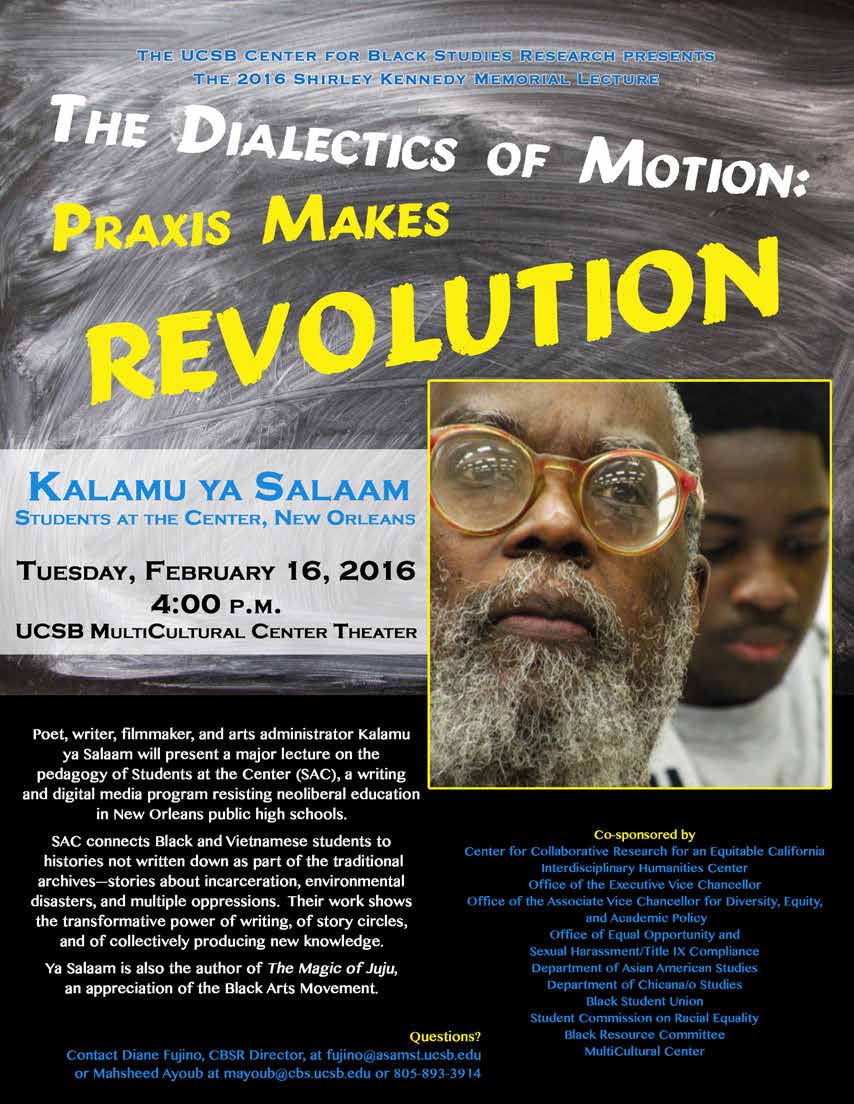
Dr. Kennedy was first and foremost a community activist and an advocate for diversity and tolerance. At UCSB she was a lecturer and, at the time of her death in 2003, the acting director of the Center for Black Studies where she had been the Outreach Coordinator for many years.
WOMXN OF COLOR CONFERENCE
As in years past, SCORE co-sponsored the annual Womxn of Color Conference with several other AS advocacy entities, including Queer Commission, Take Back the Night, Humyn Rights Board. The Hull Chair of Feminist Studies and RHA round out the list of sponsors.

This year’s conference title “Recognizing and Cultivating Intersections for Our Collective Liberation” included performances, discussion workshops and lectures from keynote speakers, including Irene Lara, professor of Women’s Studies at San Diego State University. As noted in the Daily Nexus, “organizers have laid out several questions they hope to discuss throughout the weekend, such as “How do we navigate and come to comprehend our trauma in relation to our very existence?” and “Why is it important to center our movements on love and re-incorporate joy into every aspect of our lives in order to counteract this dominant narrative of struggle?”
As part of the day long program, Karen Hannah a graduate student in Feminist Studies and Lola Mondragon, a graduate student in Chican@ Studies hosted a workshop called “Sacred Bodies, Safe Spaces: Healing in Community Through Drumming, Meditation, and Coloring.”
MILLION STUDENT MARCHES
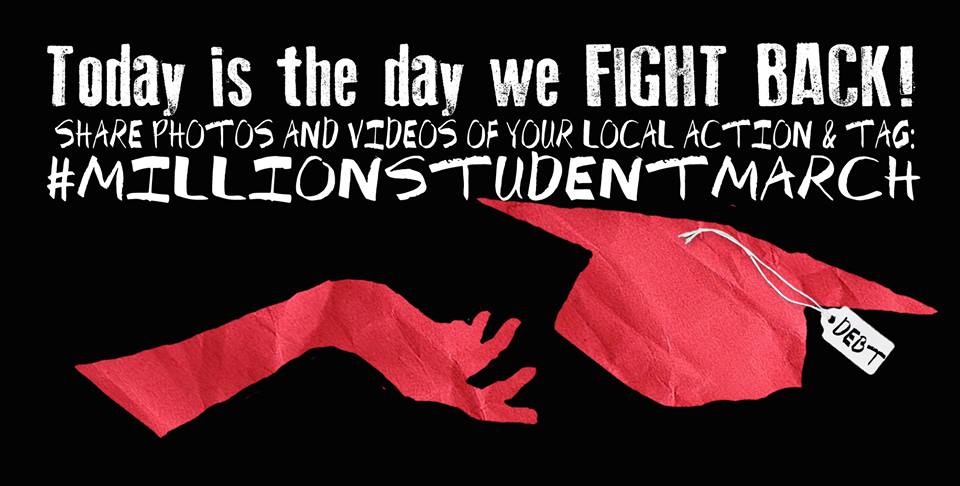
SCORE members joined several hundred other students in two Million Student Marchs in November and April. Students’ core demands were:
1) Tuition Free Public College
2) Cancellation of all Student Debt
3) A $15 minimum wage for all campus workers
The second march also introduced a wider range of issues having to do with campus climate, including responses to racist and islamophobic chalkings on campus sidewalks and voicing support for the Black Lives Matter movement.
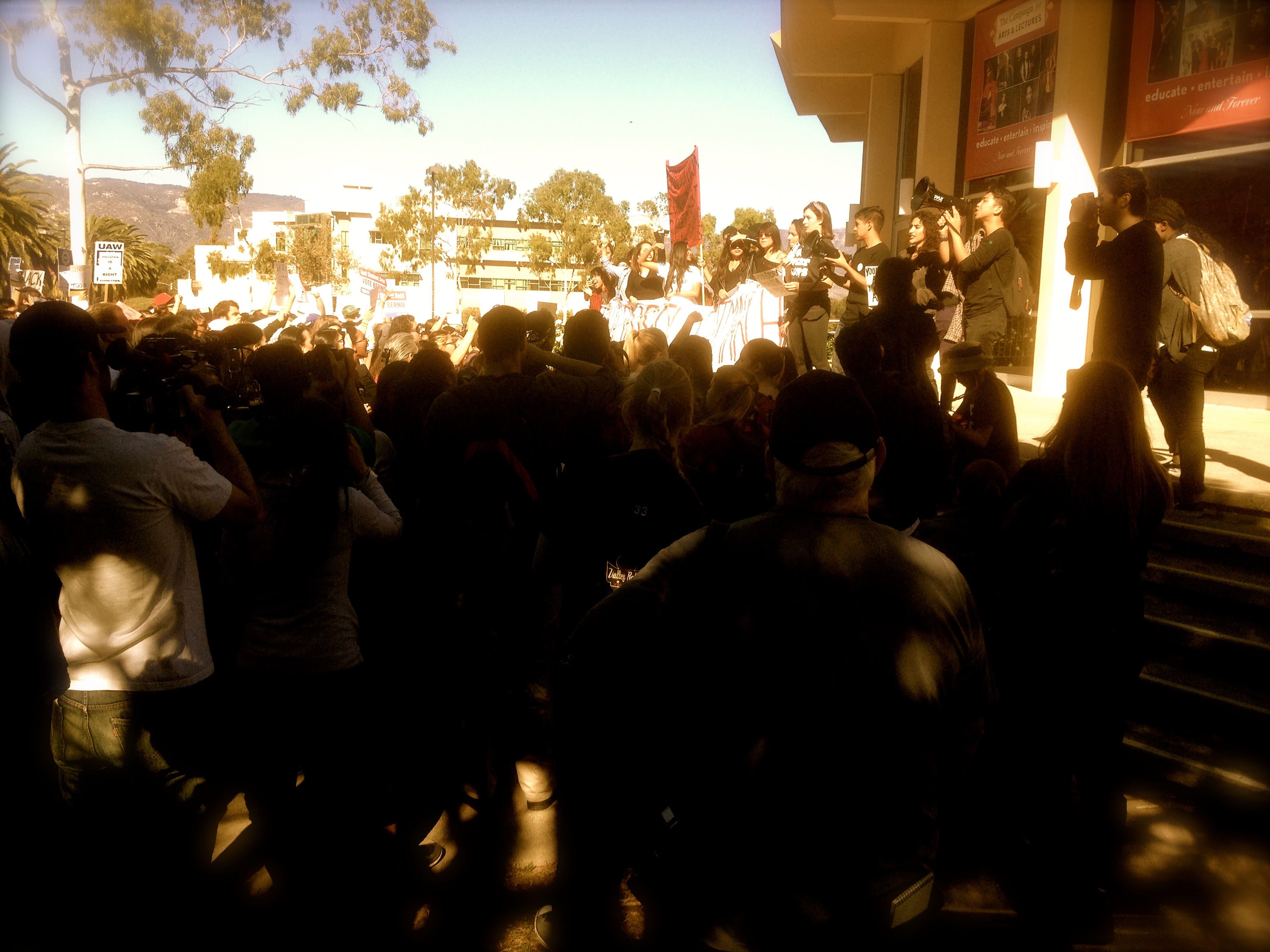
November March
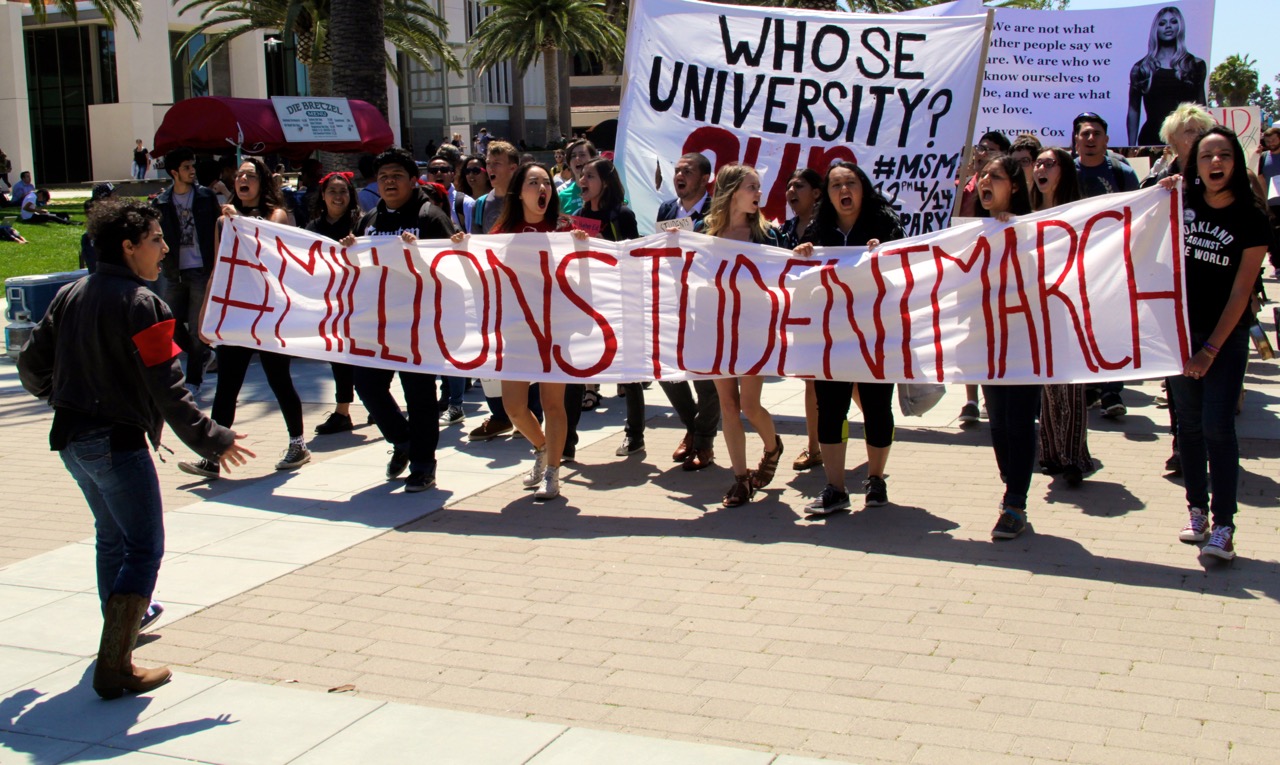
April March
INTERSECTIONAL JUSTIC CONFERENCE
SCORE Co-chairs Unique Vance and Karen Sidhu, and EAB Environmental Justice Chair Nia Mitchell attended the Intersectional Justice Conference at the Whidbey Center on Whidbey Island in Washington state.

As stated on the conference website:
“Interspecies & Intersectional Justice is a volunteer-led program pursuing human rights, animal rights, a just society, and a healthy planet through intersectionality and vegan advocacy. Our first project is the 2016 Intersectional Justice Conference, March 2016, at the Whidbey Institute.
We look at a range of social justice issues through the lens of animal rights, identify ways in which we can better collaborate between and among movements, and examine the impact of speciesism on humans, other animals, and the planet. We are dedicated to inclusion and equity, and are committed to ongoing learning, growth, and collaboration.”
3rd ANNUAL SOCIAL JUSTICE CONFERENCE
SCORE was a co-sponsor for this conference that took place in the Multicultural Center on Saturday, May 7. The Social Justice Conference organizing committee had this to say about purpose of the conference:
“This year, the Social Justice Conference wishes to provide the space for student leaders, invested in the advancement of marginalized communities, to continue their passions outside of their college careers. Our collective goal is to foster the growth of students today and for their future, creating generational support and resources.”
The conference included workshops, panel discussions, and speakers centered on a wide spectrum of topics: race, gender, environmental justice, gentrification, community bridging, and more. It was open to UCSB students and alumni, but the organizers also welcomed community members to share and learn.
CONFLICTS WITH THE AS SENATE
Several AS groups, including SCORE, signed letters to the AS Senate during spring quarter. They are presented here in their entirety and reflect the political dynamics of an organization that is defined by students who are passionately committed to making UCSB a better place for all students.
LETTER TO SENATE REGARDING HONORARIA LEGISLATION
SCORE and several other AS entities demanded a special meeting of the Senate during spring quarter to address a proposed Bill to Reform Honoraria. A letter to the Senate, signed by these entities, was posted on Facebook. The text, which is included here, focuses on the honoraria reform bill, but also speaks to an alleged history of discrimination by members of AS’s legislative body:
“We, the undersigned, demand a Special Senate Meeting this Wednesday, March 9, 2016 to address the concerns regarding the recent bill presented on March 2, 2016: A Bill to Reform Honoraria. We are extremely disappointed in the 66th Senate in their passing of this bill, especially in the severe lack of transparency and communication in the process of crafting and voting on the legislation.
First and foremost, the process in passing of A Bill to Reform Honoraria was a clear and blatant violation of the AS 2015-16 Legal Code. According to Article XI, Section 2, Clause A, “Recommendations for By-Law changes that may affect any Board, Committee, or Commission must have written or oral consultation with all parties involved.” The clause goes on to clearly state that these “parties involved” include the Chairs of the Entity and any other members. Clause D of this section goes on to specifically discuss honoraria: “any and all honoraria changes or revisions must have direct consultation with the respective Board, Committee, and Commission, before being forwarded to Senate for approval.”
Even the most liberal interpretation of this clause would come to the conclusion that in order to abide by Legal Code, the sponsors of this Bill and other Senators needed to reach out DIRECTLY to the Chairs and other members of each and every single Board, Commission, and Unit that received Honoraria (with the exception of AS Program Board, who work on the stipend system). This was not done, plain and simple. If one asked a BCU Chair at random whether they were even personally notified or emailed that this Bill was on the table, they would reply with a resounding “no.” In reference to some statements made during the Senate meeting when this was passed: this Bill does NOT just affect the BCUs that have the “highest” honoraria — it affects every single one, because it is a change to By-Laws that mandate a unilateral limit on all honoraria awards across the board.
In regards to the counterargument that all Chairs are required to read all Senate agendas and minutes, and therefore that is enough of a direct written consultation with the BCUs, we answer with a resounding “no.” The Legal Code itself will tell you this, as it is stated explicitly within the language. When Senators themselves barely read the minutes they are actually charged with voting on, how can they expect the Chairs of BCUs to read Senate agendas that rarely even affect them?
Historically, the AS Senate has not represented the interests of disenfranchised and marginalized communities; unfortunately, the 66th Senate is no exception. It was the duty of the 66th Senate to communicate with its respective BCUs to have a serious and transparent discussion about honoraria reform. Members of the Association have a right to know about the direct impact of this piece of legislation and how its enactment will affect BCUs and Entities for the next two years. This systematic lack of communication leads to problems that affect the core of Association; in this case, it resulted in skewed perspectives and overstepping of boundaries. The Senate believed that as the representative elected body of the Association they unequivocally oversee any and all financial decisions. While they do have the power to make decisions, they do NOT have the authority to do so without the consultation and input of Entities. It is dangerous to make sweeping mandates and enforce them upon any and all bodies of the Association, as it completely ignores the individual needs and processes of each BCU.
The Legal Code recognizes the autonomy of BCUs (Article XI, Section 2), and with good reason — these bodies know their operations better than anyone else, hence why they have the authority to run on their own autonomy. The Senate’s duties are in oversight and advising and collaboration, NOT in sweeping mandates. In substantially altering their abilities to award honoraria the Senate disrespected the very backbone of the Association, setting an incredibly dangerous precedent in knowingly changing the operations of BCUs without their collaboration or consultation.
The lack of communication in this legislative process can also be attributed to another serious problem: timeline. Chairs of AS Entities and other members of the Association had merely two weeks to be informed of the bill or even provide input. When the Senators chose not to directly reach out to these BCUs, it effectively shut the window of opportunity for full transparency throughout the Association. The last time the honoraria process was changed was as a part of the restructuring process of the Association. This restructure happened over the span of over two academic quarters, with consistent communication, transparency, and consultation with all BCUs. A change in honoraria has a significant impact on the way the Association works, and therefore it must be done in a similarly collaborative manner for full effectiveness: a two-week legislative process is simply and objectively not enough.
If anything was more disrespectful and disappointing than the process, however, it was the response of many of the Senators. The rationale and “counter-arguments” to defend the Bill’s passage was appalling, and in fact demonstrated how out of touch the Senate is with student needs. Some of these claims ranged from “the only BCUs that are upset about this are the ones whose honoraria is being cut” to “[honoraria] is not going to pay half of your rent for the month.”
These are misguided statements, and the unfortunate truth of the matter is that if there was any sort of communication with the BCUs before the bill was on the floor, the Senate would know so. Some Chairs that happened to be in the room when the vote was being cast actually came up and addressed these concerns, yet the Senate chose to pass the bill regardless.
For clarification: this letter is NOT an opposition to honoraria reform. Obviously, honoraria is an important point of contention because these funds come directly out of student fees paid to the Association. This deserves fair oversight and wholesome debate — as the UC campus with the highest fees we have an extra responsibility to be accountable to students and spend their money in a way that will benefit the campus as a whole. But tangible and effective reform can only occur when there is full and transparent communication with all interested parties. As members of the Association, we are in support of a conversation around honoraria reform — not legislation that is passed without even the decency of transparency.
For these reasons, we demand that the Senate hold a Special Meeting this Wednesday (3/9/16), and revisit the legislation. We believe that this legislation should be tabled until next quarter, to allow for a transparent and collaborative process.
This meeting is called by a petition of five Senators (who are undersigned parties), which as per Legal Code meets the 1/6th of voting membership required to call for a meeting. We hope to see all of you at the meeting, as we are also taking time out of our Study Week in order to address this incredibly serious and pressing matter.
Sincerely,
Senator Alejandra Melgoza
Senator Akshaya Natarajan
Senator José Magaña
Senator Dustin Larrazolo
Senator Joana Barrera
Public Safety Commission, Co-Chair, Dwayne Mosbey
Humxn Rights Board, Chair, Teresa Campa
Humxn Rights Board, Outreach Coordinator, Evelyn Diaz S.
Humxn Rights Board, Publicity Coordinator, Stephanie Truong
Isla Vista Community Relations Committee, External Chair, Aimee Hanna
Commission on Disability Equality, Commissioner, Steven Kwok
Zero Waste Committee, Chair, Stephanie Periban
Zero Waste Committee, Public Outreach Coordinator, Shirley Ng
Queer Commission, Co-Chair, Jan (Cherise) Cenon
Queer Commission, Co-Chair, Danielle Patterson
Queer Commission, Queerstorian, Tyler Nguyen
Queer Commission, Internal Coordinator, Leah Hardenbrook
Queer Commission, External Coordinator, Ernesto “Ernie” Pina
Queer Commission, Special Projects Coordinator, Ryan Carr
Queer Commission, Special Projects Coordinator, Hiro Bower
Queer Commission, Special Projects Coordinator, Marissa De la Paz
Queer Commission, Special Projects Coordinator, Kate Moser
Queer Commission, Pride Committee Co-Chair, Emanuel Suarez Jimenez
Queer Commission, Pride Committee Co-Chair, Ricardo Duarte
Environmental Affairs Board, Co-Chair, Christopher Berry
Environmental Affairs Board, Co-Chair, Nicholas Frey
External Affairs Committee
Take Back the Night, Co-Chair, Ashley Morgan
Take Back the Night, Co-Chair, Gema Hernández
Student Commission on Racial Equality, Co-Chair, Unique Vance
Office of External VP of Statewide Affairs, General Campus Organizer, Hannah Houska
Office of External VP of Statewide Affairs, Policy Analyst, Lillian Cain
Student Commission on Racial Equality, Co-Chair, Marjan Abubo
Student Initiated Recruitment and Retention Committee, Co-Chair, Nelson Monge
Student Initiated Recruitment and Retention Committee, Co-Chair, Joshua Hudson
Student Initiated Recruitment and Retention Committee, Outreach Co-Chair, Juan Pedroza
Student Initiated Recruitment and Retention Committee, Retention Co-Chair, Eric Rubio
Student Initiated Recruitment and Retention Committee, Book Bank Coordinator, Carmen Mares
Student Initiated Recruitment and Retention Committee, Secretary, Crystal Alvarez
Community Affairs Board, Co-Chair, Jeremiah Copeland
Community Affairs Board, Co-Chair, Celine Jeremiah
Community Affairs Board, Historian, Sarah Heller
Community Affairs Board, Public Relations Co-Coordinator, Connie Lin
Community Affairs Board, Alternative Breaks Co-Coordinator, Megan Wong
Womxn’s Commission, Co-Chair, Janel Sandoval
The Bottom Line, National Beat Reporter, Kelsey Knorp
The Bottom Line, Campus Beat Reporter, Gwendolyn Wu
Food Bank Committee, Chair, Yanira Jenny Flores
External Vice President for Local Affairs, Paola Dela Cruz
SCORE, Secretary, Luvia Solis
SCORE, Outreach Coordinator, Jennifer Kim
External Affairs Committee, Student At-Large, Midori Garcia
+ Many other student leaders!!!
SCORE’S LETTER OF NO CONFIDENCE TO THE AS SENATE
The year ended on a contentious note, which included a letter of no confidence written to the AS Senate and an investigation of the AS and campus-wide elections by UCSB Audit and Advisory Services. The letter, whose sentiments were echoed by several other AS entities, was a response to a vote at the last meeting of the outgoing Senate to remove AS Executive Director Marisela Marquez from office. The vote failed to gain the necessary super majority, but it was emblematic of a year of frustrations with the Senate. The letter is posted on SCORE’s Facebook site:
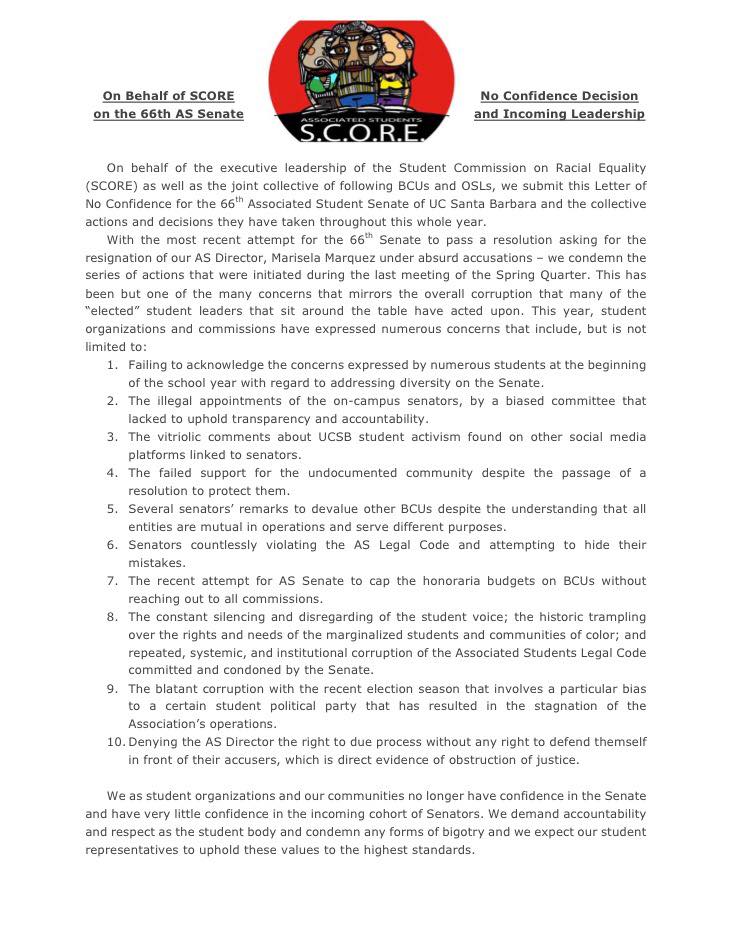
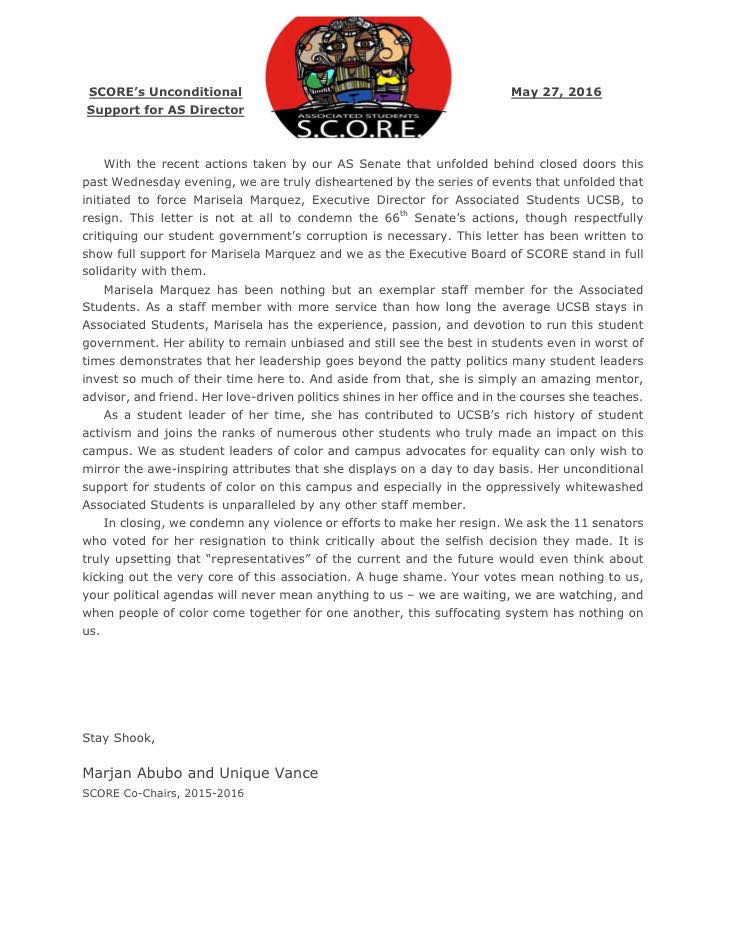

Recent Comments